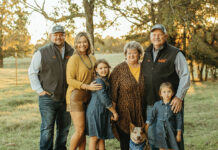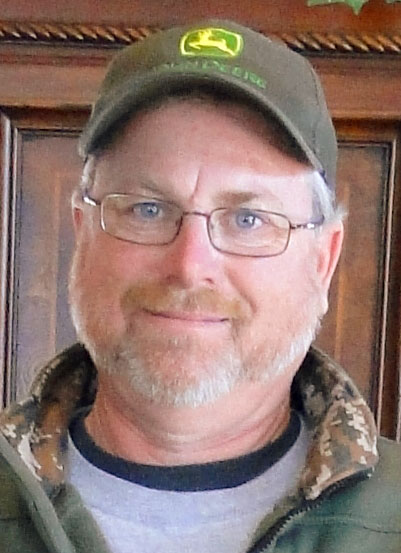
Joe and Carel Leak of Proctor, Okla., have constructed two pasture-raised chicken houses for layers whose eggs are destined to be marketed as pasture-raised and organic by Vital Farms.
“Vital Farms ensures our eggs are everything they are advertised to be,” Joe said.
Originally based in Austin, Texas, Vital Farms has recently expanded and has started working with a number of farmers in Oklahoma, Arkansas and Missouri. Joe and Carel will be two of the newest farmers to join the Vital team. They’ve been working long days to ensure their farm will be ready for their first flock.
Vital Farms has provided directions for construction in addition to the basic outer dimensions of the chicken houses to promote optimum efficiency, including side doorway, windows and cooler dimensions. Preferred Poultry is constructing the wooden truss, pole barn design enclosed houses. Floors are concrete for better disease control and to accommodate wetter hen litter. Joe said, “Cleanout with disinfectant is easy on these floors.”
Although the birds spend much of their time outside, the construction of the houses is still important, so each one is to be built to meet the pasture-raised standards specified by Certified Humane, an independent farm animal welfare auditor. Easy outdoor access is essential, so there are adequate exit areas every 50 feet (at least 18 inches high and 21 inches wide). To cater to the hens’ needs, there are ample nest boxes with privacy screens and sufficient space for perching. Two and a half acres of surrounding pasture is required for every 1,000 birds on a regular rotational pasture basis, and the furthest point of pasture should be no further from barn entrance than the hens are able to roam.
Joe opted for one upgrade. He is installing a sophisticated alarm system that will alert him wherever he is.
“I remember as a kid and going to town with my dad,” Joe said. “He was always pushing us to return quickly so he could check on his broiler chickens and houses. I can’t have that kind of pressure because I work on so many other things. Being alerted anywhere I am is critical for my success.”
One reason Joe opted for a pasture-raised/organic chicken operation was the opportunity to complete parts of the construction process himself. He cleared land for the houses and fencing, dug the water line trenches, ran the electric, and will finish the inside and set his own feed bins.
“The operation requires less risk, provides a better profit margin with a quicker payout, and maintains a lighter environmental footprint,” Joe added. “Also, pasture-raised houses are expected to have very few future upgrades. … The simplicity of this system is both beautiful and a modified return to more traditional rural agriculture.”
Part of that return involves the chickens having access to grass and wooded pastures, which provide part of their feed, as well as exercise that enhances the breeds’ natural sturdiness. Birds are allowed outside 365 days a year unless weather conditions are prohibitive.
Another part of returning to a more traditional rural-style is using sheep to maintain mandated grass height and goats to keep forest underbrush controlled. While Certified Humane will allow artificial shade, natural shade is preferred, which is perfect for Joe’s Ozarks terrain. Although the entire system is designed to make the nesting area as inviting as possible, external waterers are available when the chickens are outside.
Vital Farms recommends either Bovans Brown or similar strains, resilient birds with a docile manner and high production rate. What this means for the farmer is less feed per bird, no water or feeder height adjustments and infrequent flock changes with less farmer time investment.
The Leaks also have a commercial cattle operation on 360 owned and leased acres with 160 predominantly Angus mommas cows and three bulls, two Angus and one Simangus.
“Black is what sells and what puts premiums on calves. If you can get a good mix and put black on it, you have it made,” Joe said.
Off the farm, Joe is a forest ranger. He’s on call 365 days a year, 24-hours a day and his specialty is dozing around wildfires to prevent spreading. His area has 300 to 800 fires a year with as many as seven in a day during high danger season.
“None of this would be possible without my wife who is not only unafraid to speak her mind but also does whatever needs to be done when it needs to be done. She is my full partner,” Joe said of his family’s farming operation.
The Leaks have two older daughters, Katie and EmmaLee, who no longer live at home, and three children living the farm life they love: 16-year-old Philip, 3 1/2-year-old Jorel and Michael who is less than a year old.







